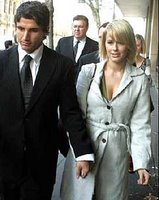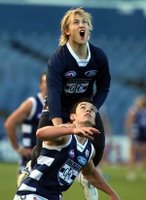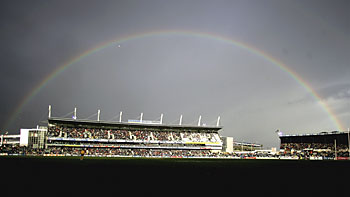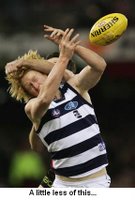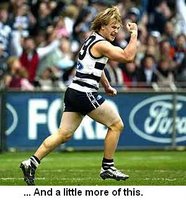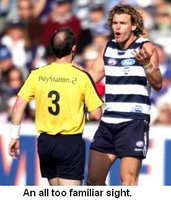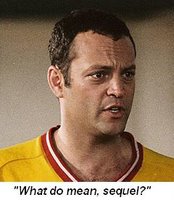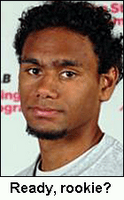I think it’s fair to say that so far this season Geelong has failed to live up to expectations, in fact, it wouldn’t be going too far to say that they have fallen a long way fucking short of expectations. But I guess that’s the thing about expectations, very rarely does anything live up to them. To get lost in the hype of where one team stands as opposed to the others, and what would be a reasonable return in terms of wins and losses for the season, is dangerous business, for in this ever empirical, increasingly binary world of ours there is no such thing as should; there is only 1 and 0, or 1 and not 1.
It’s a very simple idea; the only games you should have won, are the ones you did win. You can never say, “We deserved to win that game,” if, in actuality, you did not win. It’s a retro-active concept; that is, applied after the fact. So, after 9 games this year we can safely say Geelong should have won 3 of those, which they have. Hopefully that much is obvious.
Here is where it gets a bit curly. Purely in binary terms, Geelong’s remaining games will be either wins or losses. No other meaning or value can be applied to them. There will not be games they should have won. There will not be games they could have won. Remember, 1 or 0. This is the only value that will be applied to each game, and only after the fact: Much like Schrödinger’s Cat, the remaining matches are simultaneously wins and losses.
This season Collingwood have been performing well above popular expectation, and therefore make for an interesting case study. Last year they finished the season in 15th place, one spot above wooden spooners Carlton. This season, so far, they have lost only twice, to Adelaide and West Coast, and currently sit 2nd on the ladder. They are undoubtedly playing good football, but where has the improvement come from? How are they suddenly a 10 goal better side than last season? (And for those of you who quickly answered, injuries, or lack thereof, that is but one small aspect. Geelong’s injury list was comparable, if not longer than Collingwood’s last year, yet when they met this year, both at full strength, Collingwood won by 102 points.)
Commentators and so-called football ‘experts’ struggle to adequately explain, or avoid all together, the quantifiable differences between winning and losing teams, and instead point to abstract concepts such as confidence and belief as the difference; tell me, how can the collective consciousness of a rotating group of 22 men be so simply and categorically stated, let alone measured?
Changing tack now, when’s the best time to bet on AFL matches? The first 4 rounds of any season. Why? Because the bookmakers, like the rest of us, have no idea how good or bad any particular team is. Sure, they have expectations; after all, that is how they frame a market. But it is also what makes them fallible, as evidenced by the big odds payed out in the Geelong v Hawthorn game Round 3, and Brisbane v Richmond in Round 4.
Flashback, March 21st 2005: Sydney, the eventual AFL premiers, are quoted by Centrebet as an 18-1 chance to win the flag that year. Carlton, who would finish last, is 14-1.
Let me ask you this; everyone wants, and likes the idea of an even competition, but do you think we will ever see a season where every team finishes with 11 wins and 11 losses, with ladder positions being assessed purely on percentage? Why not? Surely that is what the draft and salary capping is aimed at, complete parity. Would that be a great season, or a terrible season? Who would be the premiership favourite then?
This year Centrebet currently has more money invested on Paul Roos’ boys to finish last in 2006 than them making it back-to-back flags. Veteran Centrebet bookmaker Gerard Daffy; “It's unprecedented, unheard of, in any code. We have had more bets on Carlton and Hawthorn winning the flag than we’ve had on Sydney.” Madness or genius?
So, what am I driving at here, what is at the crux, at the heart of this series of seemingly connected questions that I have offered you? Where is this trail of bread crumbs leading you: to the safety of Grandma (a neat conclusion), or the peril of the big, bad wolf (chaos and uncertainty)?
The binary system, 1 and 0, does a good job of representing wins or a losses for football clubs because it’s only ever that bottom line that is measured, valued, remembered. If a team lost every match of the season, by a single point in each game, the fact would remain that they had lost every game; the gap between 1 and 0 may as well be a mile if it’s an inch, it doesn’t matter.
However, a paradox exists in that every facet of AFL football, from playing lists to coaching staff to tactics to off-field aspects, is incredibly close, and the results, be it week-to-week, or season-to-season, echo this, swinging wildly in either direction after what appears to be minimal change. Should we be disappointed Geelong lost to Richmond? Sure, but we shouldn’t be surprised.
If all this has confused things rather than clarify, then I apologize. But let me take one last stab at it by looking at the object of every players desire; (no, not Anthony Stevens’ wife) the ball itself. Every other ball sport in the world uses the round ball, good ol’ predictable round ball, be it soccer, tennis, Gaelic football, volleyball, netball or even handball. The only other sports that use a similar shaped ball are Rugby and American Football; only in these sports whenever the ball hits the ground the play is stopped. The Australian Rules oval shaped ball by its very nature is unpredictable. This unpredictability is a lot like the AFL itself; the variables in our game are so many, and the range of outcomes for any particular contest, or even the bounce of the ball, is so great, that the game itself will always be unpredictable. Some days it bounces right into your lap and others, right over your head, and into the arms of Nick Fucking Davis. The trick is not to blame, or become too frustrated with this unpredictability, but rather accept it as part of what makes our game unique and exciting.
So I’ll be at a half capacity Skilled Stadium this Saturday, cheering for Geelong against ladder leaders West Coast, you never know, Geelong will probably win by 5 goals, or rather, it’s equally as likely that they’ll win by 5 goals as lose by that margin, or reel off 10 straight wins. After all, it’s only 1’s and 0’s.
